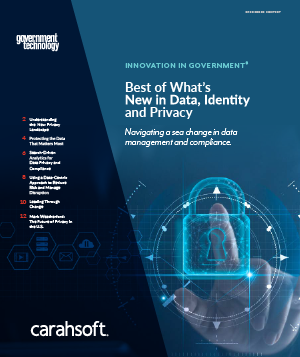Learn the latest trends in data, identity and privacy for state and local government
As state and local governments invest in contact tracing efforts that leverage phone location data to slow the spread of COVID-19, these initiatives have given new relevance to an issue that’s been simmering for several years. Massive technology-enabled growth in the collection and monetization of personal data has sparked pushback in the form of legislation intended to give citizens more control over how organizations collect, use and protect information about them. State lawmakers introduced hundreds of privacy bills this past year to address these growing concerns, including the California Consumer Privacy Act (CCPA).
All of this points to a dramatic shift in how state and local government agencies must manage and protect data. The societal shift toward reasserting privacy as a fundamental right is driving heightened citizen expectations for government agencies to be responsible stewards of personal information. It’s also reshaping the regulatory environment for public and private sector organizations.
Fortunately, technology tools available to help governments address privacy challenges are growing smarter and more sophisticated. For instance, data discovery tools can help agencies understand where sensitive data is stored and how it is used by various systems. In addition, intelligent risk management solutions use artificial intelligence and machine learning to continuously monitor compliance with security and privacy requirements across complex IT environments.

- 45% of counties have a full-time position dedicated to enterprise privacy responsibilities.
- 36% of cities have a full-time position dedicated to enterprise privacy responsibilities.
- 13 states have appointed a chief privacy officer (CPO) or similar position.
- Data governance ranked #6 in the top 10 technology priorities for city and county CIOs.
Download the report to learn how your agency or municipality can join the growing conversation around data governance and how emerging technologies can support smarter and more secure data usage. Featuring industry research and insights from data, identity and privacy leaders at Broadcom, Dell Technologies, Tableau and ThoughtSpot.

